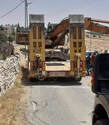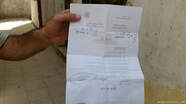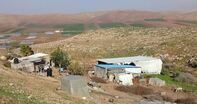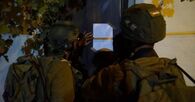6 june 2020

Israeli military ordered today a halt on the construction of a basic school in the village of Kisan, near the city of Bethlehem in the occupied West Bank, according to local sources.
A large Israeli military force raided the village and ordered the workers at the site of construction to stop all works, under the pretext that the school is being built without an Israeli permit.
The area where the construction is ordered to stop is located in Area C of the West Bank, under full Israeli administrative and military control, where Israel rarely issues construction permits to Palestinians, forcing many people to build without permits.
Israel refuses to allow Palestinian development of any kind in Area C, which makes up over 60 percent of the total area of the occupied West Bank, and often demolishes what Palestinians build despite the Israeli ban.
A large Israeli military force raided the village and ordered the workers at the site of construction to stop all works, under the pretext that the school is being built without an Israeli permit.
The area where the construction is ordered to stop is located in Area C of the West Bank, under full Israeli administrative and military control, where Israel rarely issues construction permits to Palestinians, forcing many people to build without permits.
Israel refuses to allow Palestinian development of any kind in Area C, which makes up over 60 percent of the total area of the occupied West Bank, and often demolishes what Palestinians build despite the Israeli ban.
27 may 2020

Israeli forces ordered a halt on the construction of some structures in al-Walaja village, west of the southern West Bank city of Bethlehem, said a local source.
Coordinator of the local Anti-Wall and Settlement Committee Hassan Breija and the village mayor Khader al-'Araj said that Israeli forces raided Ein Jowaize area in the village, where they handed a villager a military order to stop the construction of his retaining walls.
Soldier delivered military orders to stop the construction of several house basements and a water well.
They also handed several other villagers notices, ordering them to appear before intelligence for interrogation over the construction of their houses and warehouses.
Located at a horizontal distance of 5 kilometers to the west of Bethlehem, al-Walaja has a population of some 2,800 and occupies a total area of 4,328 dunams.
Under the Oslo Accords, an agreement made 25 years ago that was supposed to last just five years towards a self-governing country alongside Israel, the Palestinian Authority was given ed control over a small pocket of land occupying 113 dunams and accounting for only 2.6 percent of the village’s total area.
This area is classified as Area B. In contrast, Israel maintains control over the remainder, classified as Area C.
An area of 4,209 dunams of the village, accounting for 97 percent, is completely isolated by the section of Israel’s apartheid wall. The majority of this land is agricultural land, forests and open spaces.
The village is flanked by two Israeli colonial settlements; Gilo from the east and Har Gilo from the south.
Using the pretext of illegal building, Israel demolishes houses on a regular basis to restrict Palestinian expansion in occupied Jerusalem.
At the same time, the municipality and government build tens of thousands of housing units in illegal settlements for Jews with a goal to offset the demographic balance in favor of the Jewish settlers in the occupied city of Jerusalem.
Israel refuses to permit virtually any Palestinian construction in Area C, which constitutes 60 percent of the occupied West Bank and falls under full Israeli military rule, forcing residents to build without obtaining rarely-granted permits to provide shelters for their families.
In contrast, Israel much more easily gives the estimated 550,000 Jewish Israeli settlers there building permits and provides them with roads, electricity, water and sewage systems that remain inaccessible to many neighboring Palestinians.
Coordinator of the local Anti-Wall and Settlement Committee Hassan Breija and the village mayor Khader al-'Araj said that Israeli forces raided Ein Jowaize area in the village, where they handed a villager a military order to stop the construction of his retaining walls.
Soldier delivered military orders to stop the construction of several house basements and a water well.
They also handed several other villagers notices, ordering them to appear before intelligence for interrogation over the construction of their houses and warehouses.
Located at a horizontal distance of 5 kilometers to the west of Bethlehem, al-Walaja has a population of some 2,800 and occupies a total area of 4,328 dunams.
Under the Oslo Accords, an agreement made 25 years ago that was supposed to last just five years towards a self-governing country alongside Israel, the Palestinian Authority was given ed control over a small pocket of land occupying 113 dunams and accounting for only 2.6 percent of the village’s total area.
This area is classified as Area B. In contrast, Israel maintains control over the remainder, classified as Area C.
An area of 4,209 dunams of the village, accounting for 97 percent, is completely isolated by the section of Israel’s apartheid wall. The majority of this land is agricultural land, forests and open spaces.
The village is flanked by two Israeli colonial settlements; Gilo from the east and Har Gilo from the south.
Using the pretext of illegal building, Israel demolishes houses on a regular basis to restrict Palestinian expansion in occupied Jerusalem.
At the same time, the municipality and government build tens of thousands of housing units in illegal settlements for Jews with a goal to offset the demographic balance in favor of the Jewish settlers in the occupied city of Jerusalem.
Israel refuses to permit virtually any Palestinian construction in Area C, which constitutes 60 percent of the occupied West Bank and falls under full Israeli military rule, forcing residents to build without obtaining rarely-granted permits to provide shelters for their families.
In contrast, Israel much more easily gives the estimated 550,000 Jewish Israeli settlers there building permits and provides them with roads, electricity, water and sewage systems that remain inaccessible to many neighboring Palestinians.
20 may 2020

Israeli forces today ordered a halt on the construction of two mobile homes in al-Auja town, located to the north of Jericho city, said local sources.
Sources confirmed that Israeli forces handed Ali Rashayda a military notice, ordering him to evict his two mobile homes and stop their construction.
Horizontally located 10 kilometers to the north of Jercho, al-Auja has a population of some 5,470 and occupies a total area of some 107,000 dunums.
Under the Oslo Accords, an agreement made 25 years ago that was supposed to last just five years towards a self-governing country alongside Israel, the Palestinian Authority was given control over a small pocket of land classified as Area A, which occupies 16,519 dunams and accounts for 15.5 percent of the village’s total area. In contrast, Israel maintains control over the remainder, classified as Area C.
Israel has severely restricted Palestinian access to water in the area, particularly that local water springs, including 'Ein al-Auja (al-Auja spring), are located within Area C.
Local water springs are susceptible to dryness as a result of Israel’s control over water.
Israel have set up huge wells over the local hot water basins, reducing the quantity of water flowing from the spring and causing destruction to thousands of dunums of agricultural land irrigated by the water spring.
Israel has seized at least 2,257dunams belonging to the village for the construction of four nearby colonial settlements, 2,152 dunums for the construction of a military base, besides to more land for opening settler-only by-pass roads, pushing the villagers into a crowded enclave, a ghetto, surrounded by walls, settlements and military installations.
Israel demolishes Palestinian houses and structures almost on a daily basis as a means to achieve “demographic control” of the occupied territories.
Israel denies planning permits for Palestinians to build on their own land or to extend existing houses to accommodate natural growth, particularly in Jerusalem and Area C, which constitutes 60 percent of the occupied West Bank and falls under full Israeli military rule, forcing residents to build without obtaining rarely-granted permits to provide shelters for their families.
In contrast, Israel argues that building within existing colonial settlements is necessary to accommodate the “natural growth” of settlers. Therefore, it much more easily gives the estimated 550,000 Jewish Israeli settlers there building permits and provides them with roads, electricity, water and sewage systems that remain inaccessible to many neighboring Palestinians.
Sources confirmed that Israeli forces handed Ali Rashayda a military notice, ordering him to evict his two mobile homes and stop their construction.
Horizontally located 10 kilometers to the north of Jercho, al-Auja has a population of some 5,470 and occupies a total area of some 107,000 dunums.
Under the Oslo Accords, an agreement made 25 years ago that was supposed to last just five years towards a self-governing country alongside Israel, the Palestinian Authority was given control over a small pocket of land classified as Area A, which occupies 16,519 dunams and accounts for 15.5 percent of the village’s total area. In contrast, Israel maintains control over the remainder, classified as Area C.
Israel has severely restricted Palestinian access to water in the area, particularly that local water springs, including 'Ein al-Auja (al-Auja spring), are located within Area C.
Local water springs are susceptible to dryness as a result of Israel’s control over water.
Israel have set up huge wells over the local hot water basins, reducing the quantity of water flowing from the spring and causing destruction to thousands of dunums of agricultural land irrigated by the water spring.
Israel has seized at least 2,257dunams belonging to the village for the construction of four nearby colonial settlements, 2,152 dunums for the construction of a military base, besides to more land for opening settler-only by-pass roads, pushing the villagers into a crowded enclave, a ghetto, surrounded by walls, settlements and military installations.
Israel demolishes Palestinian houses and structures almost on a daily basis as a means to achieve “demographic control” of the occupied territories.
Israel denies planning permits for Palestinians to build on their own land or to extend existing houses to accommodate natural growth, particularly in Jerusalem and Area C, which constitutes 60 percent of the occupied West Bank and falls under full Israeli military rule, forcing residents to build without obtaining rarely-granted permits to provide shelters for their families.
In contrast, Israel argues that building within existing colonial settlements is necessary to accommodate the “natural growth” of settlers. Therefore, it much more easily gives the estimated 550,000 Jewish Israeli settlers there building permits and provides them with roads, electricity, water and sewage systems that remain inaccessible to many neighboring Palestinians.
13 may 2020

The Israeli occupation forces (IOF) on Wednesday demolished several agricultural structures and the foundations of a house under construction in Fasayil village, north of Jericho city in the West Bank.
According to local sources, Israeli bulldozers escorted by troops stormed Fasayil village and embarked on razing structures used for agricultural purposes belonging to a local resident called Suleiman Sawarka.
The bulldozers also razed the foundations of a house belonging to another citizen called Mahmoud al-Kaabneh, who received a week ago a military notice ordering him to stop building the house.
According to local sources, Israeli bulldozers escorted by troops stormed Fasayil village and embarked on razing structures used for agricultural purposes belonging to a local resident called Suleiman Sawarka.
The bulldozers also razed the foundations of a house belonging to another citizen called Mahmoud al-Kaabneh, who received a week ago a military notice ordering him to stop building the house.
12 may 2020

Israeli occupation authorities (IOA) on Monday ordered a halt to the construction of 8 Palestinian houses and a park in Nahalin town in the West Bank district of Bethlehem.
Deputy mayor of Nahalin Hani Fannoun said that the IOA distributed stop-work notices against a park and 8 Palestinian houses, some of which are already inhabited.
He said the IOA claimed the structures are being built without Israeli license.
According to Fannoun, the IOA repeatedly threatens to demolish existing homes or orders a halt to the construction of new ones under various pretexts in an attempt to empty the area of Palestinian residents and clear the way for new settlement projects.
Deputy mayor of Nahalin Hani Fannoun said that the IOA distributed stop-work notices against a park and 8 Palestinian houses, some of which are already inhabited.
He said the IOA claimed the structures are being built without Israeli license.
According to Fannoun, the IOA repeatedly threatens to demolish existing homes or orders a halt to the construction of new ones under various pretexts in an attempt to empty the area of Palestinian residents and clear the way for new settlement projects.
11 may 2020

The Israeli army today ordered a Palestinian farmer to stop construction of an agricultural structure in his land in Sahl al-Buqeiah, south of the Jordan Valley city of Tubas, according to a local rights defender.
Aref Daraghme said soldiers broke into the village and ordered a local resident to stop the construction under the pretext he does not have a building permit.
The area is classified as C, which is under full Israeli military rule and where Israel does not allow any Palestinian development.
Israel plans to annex the Jordan Valley, a step that has provoked local and international criticism and warning.
Aref Daraghme said soldiers broke into the village and ordered a local resident to stop the construction under the pretext he does not have a building permit.
The area is classified as C, which is under full Israeli military rule and where Israel does not allow any Palestinian development.
Israel plans to annex the Jordan Valley, a step that has provoked local and international criticism and warning.
5 may 2020

Israeli forces Tuesday issued notices to stop the construction of several Palestinian houses in Aqabah village, to the north of the occupied West Bank city of Tulkarm, according to WAFA correspondent.
She added that Israeli military vehicles stormed the village, where soldiers and officers of the so-called Israeli Planning Committee handed six villagers notices, ordering them to halt the construction of their houses.
The village mayor Tayseer Amarneh said that Israeli forces ordered a halt on these houses purportedly for being located in Area C despite the fact that the homeowners possess proper land ownership documentation.
The houses, some of which are already built and ready to be inhabited, are located at the village entrance and are one-kilometer away from the section of the Israeli unilaterally-built apartheid wall.
Israel has constructed a section of the apartheid wall, which encircles the village from three directions, confiscating and isolating some 4,050 dunams of fertile land for colonial settlement activities and pushing the villagers into a crowded enclave, a ghetto, surrounded by walls, settlements and military installations.
Israel demolishes Palestinian houses and structures almost on a daily basis as a means to achieve “demographic control” of the occupied territories.
Israel denies planning permits for Palestinians to build on their own land or to extend existing houses to accommodate natural growth, particularly in Jerusalem and Area C, which constitutes 60 percent of the occupied West Bank and falls under full Israeli military rule, forcing residents to build without obtaining rarely-granted permits to provide shelters for their families.
In contrast, Israel argues that building within existing colonial settlements is necessary to accommodate the “natural growth” of settlers. Therefore, it much more easily gives the estimated 550,000 Jewish Israeli settlers there building permits and provides them with roads, electricity, water and sewage systems that remain inaccessible to many neighboring Palestinians.
She added that Israeli military vehicles stormed the village, where soldiers and officers of the so-called Israeli Planning Committee handed six villagers notices, ordering them to halt the construction of their houses.
The village mayor Tayseer Amarneh said that Israeli forces ordered a halt on these houses purportedly for being located in Area C despite the fact that the homeowners possess proper land ownership documentation.
The houses, some of which are already built and ready to be inhabited, are located at the village entrance and are one-kilometer away from the section of the Israeli unilaterally-built apartheid wall.
Israel has constructed a section of the apartheid wall, which encircles the village from three directions, confiscating and isolating some 4,050 dunams of fertile land for colonial settlement activities and pushing the villagers into a crowded enclave, a ghetto, surrounded by walls, settlements and military installations.
Israel demolishes Palestinian houses and structures almost on a daily basis as a means to achieve “demographic control” of the occupied territories.
Israel denies planning permits for Palestinians to build on their own land or to extend existing houses to accommodate natural growth, particularly in Jerusalem and Area C, which constitutes 60 percent of the occupied West Bank and falls under full Israeli military rule, forcing residents to build without obtaining rarely-granted permits to provide shelters for their families.
In contrast, Israel argues that building within existing colonial settlements is necessary to accommodate the “natural growth” of settlers. Therefore, it much more easily gives the estimated 550,000 Jewish Israeli settlers there building permits and provides them with roads, electricity, water and sewage systems that remain inaccessible to many neighboring Palestinians.
